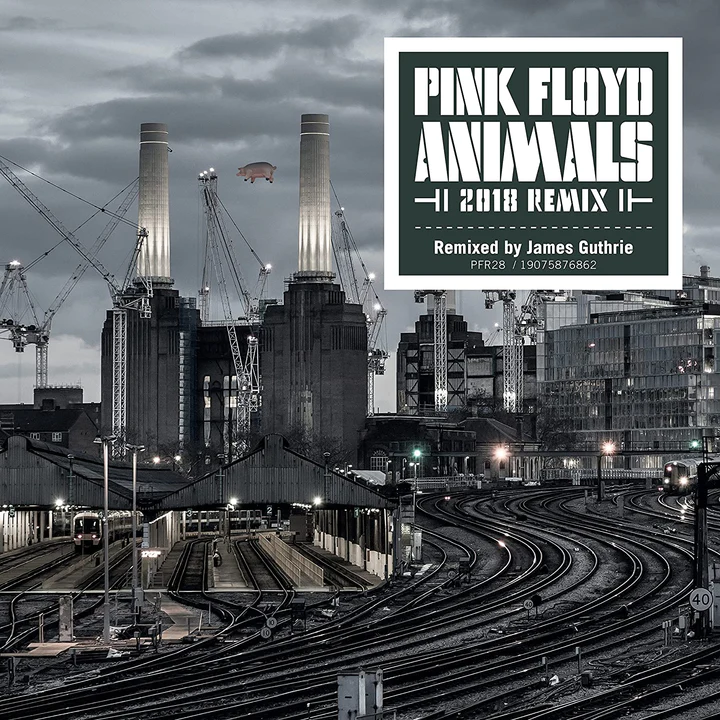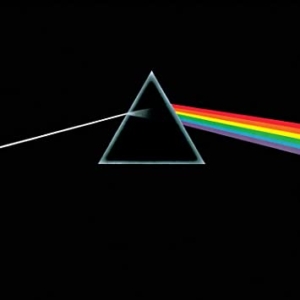Pink Floyd’s Animals: Treasure or Trash?
Welcome back to the Paradise Found Records blog. This month’s musical offerings include the “2018 Remix” of Pink Floyd’s Animals, originally released in 1977. Why, you may ask, is the 2018 Remix being released in 2022? It turns out that the acrimony between surviving members Roger Waters and David Gilmour is so strong that they couldn’t agree on the liner notes for the record! Popular music may have a long, rich history of brothers who couldn’t stand each other (e.g. the Everlys, the Louvins, the Davies and the Robinsons), but none of them have anything on Waters and Gilmour. In the decades since Waters departed in 1984, the two have fought–sometimes in court and often in the media–over who gets to use the name “Pink Floyd” and who deserves more credit for the band’s global success. The long-delayed release of this Animals edition is a direct reflection of their inability to get along. Sonically, the remixed edition provides a cleaner, brighter version of the record.

Last October I answered the age-old question of whether Steely Dan’s Gaucho is treasure or trash. That album is both the pinnacle of Yacht Rock (not necessarily a good thing) and the peak of the group’s studio prowess. This month I apply the same test to Animals, an album highly regarded by many Pink Floyd fans that still doesn’t have the reputation (or the sales) of their most popular work.
But first, a little history and some of my personal experience with one of the best-selling British rock acts of the past sixty years. The Beatles might have needed a group therapy session by their 1970 breakup, but they largely kept their eyes focused on love as what we all need. The Rolling Stones and Led Zeppelin, their peers in the late sixties and early seventies, took the opposite approach and made hay scaring the daylights out of your parents. Jagger and Richards rhapsodized the devil and hard drugs, while Page and Plant were coming to steal your daughter and administer the hammer of the Gods (and who knows what else) backstage. Within this musical background, Pink Floyd was relatively benign. Sure, they seemingly made music created as a backdrop for drug use, and original lead songwriter Syd Barrett vanished in a haze of mental illness, but “Money” was radio-friendly and even sober people could sing along. Meddle, their sixth studio effort released late in 1971, hinted at a potential for larger-scale popularity. Dark Side of the Moon, released in early 1973, became one of the biggest sellers of all time, remaining on the Billboard chart for an incredible 962 weeks. Its follow-up, Wish You Were Here, was almost as popular. And so Animals was released in the wake of one of the best one-two punches in the history of classic rock.
 I was a middle-schooler the first time I heard Dark Side of the Moon. A friend with an epic stereo setup invited me over for a listening session. He had some hard-to-find Maui Wowie pot, which was about as potent as you could find at the time. We took a few hits, turned off the lights and dropped the needle on side one. Talk about making an impression: here was evocative and insightful multi-layered rock centered around universal themes about the human condition, the never-ceasing passage of time, the greed for money and power, and the endless wars between “us and them.” Dark Side of the Moon became the primer for anyone who ever tried marijuana, but was also compelling and commercial enough to appeal to the non-stoner crowd. The record is that rare beast, a bestseller with massive adulation that wholly deserves its universal critical accolades.
I was a middle-schooler the first time I heard Dark Side of the Moon. A friend with an epic stereo setup invited me over for a listening session. He had some hard-to-find Maui Wowie pot, which was about as potent as you could find at the time. We took a few hits, turned off the lights and dropped the needle on side one. Talk about making an impression: here was evocative and insightful multi-layered rock centered around universal themes about the human condition, the never-ceasing passage of time, the greed for money and power, and the endless wars between “us and them.” Dark Side of the Moon became the primer for anyone who ever tried marijuana, but was also compelling and commercial enough to appeal to the non-stoner crowd. The record is that rare beast, a bestseller with massive adulation that wholly deserves its universal critical accolades.
Wish You Were Here came out in September of 1975, as tenth grade started for me. My friend Steve and I bought it the day it was released, went back to his place and listened with high expectations on his huge new speakers to the follow-up to the epic Dark Side of the Moon. We were not disappointed. The most humorous part of that afternoon was watching Steve freak out at the end of “Have a Cigar,” when the volume level seemingly fried out the speakers, causing him no small amount of distress. It wasn’t until about halfway through the following, title track that we both realized that the sudden reduction in volume was deliberate and temporary.
Needless to say, I was stoked for the release of Animals in early 1977, although my excitement proved somewhat unwarranted once I started listening. Some of that disappointment was mitigated by seeing the band for the first time a few months later, a concert from the legendary tour that featured a giant pig flying over the audience as the group played the album (and Wish You Were Here) from start to finish. Animals was followed by The Wall in 1979, which was essentially the group’s final hurrah (sorry, Final Cut fans). From that point on the group became a nostalgia act as the psych- and prog-rock that dominated the seventies was rendered highly uncool by the tidal wave of punk, new wave and pop that changed the musical landscape in the years before rap and grunge took over.
Here, then, are the arguments for and against Animals:
 ANIMALS IS PINK FLOYD’S UNDERRATED GEM
ANIMALS IS PINK FLOYD’S UNDERRATED GEM
How does a band even attempt to top two of the most popular classic rock albums of all time? For Pink Floyd the answer was to deliver an unflinchingly negative, angry screed about the state of humanity into the anxious arms of their sizable fan base. Commercial appeal never appeared to be a conscious goal for the group, but it is still impressive that Animals is so focused on being unfriendly. Other than the brief, acoustic “Pigs on the Wing” that opens and closes the record, the LP features three lengthy tracks, the shortest of which clocks in at over ten minutes. Lyricist Waters bravely makes no concessions to his large North American audience; when he sings “Hey you, Whitehouse” in “Pigs (Three Different Ones)”, he’s referring to Mary Whitehouse, a British morality campaigner that no one on this side of the pond had ever heard of.
Animals takes George Orwell’s 1944 novella Animal Farm as its premise and expands it into a deeply cynical musical landscape. Waters was clearly angry and disillusioned about the state of human affairs, a sentiment that was hardly unique in a musical world increasingly dominated by punk and hardcore, but Pink Floyd still focused on imparting a message that fans might not have wanted to hear. Animals could not have been more direct: Humanity is composed of beasts, from the dogs who cull the weakest from the herd to the businessmen and politicians who leverage power for greed to the sheep who rely on religion and the safety of the flock for security. “Pigs on the Wing” offers the faintest bit of optimism to make the message go down a little smoother, but let’s not kid ourselves: Animals has little positive to say, and Pink Floyd deserve a lot of credit for focusing on a dark theme unflinchingly without regard to commercial potential. This was peak Pink Floyd, artistry determined to not give the people what they were expecting. Add in some of David Gilmour’s best guitar work–each of the three main tracks features lengthy, screaming solos–and the end result is a record that very much deserves the reverence with which many of the group’s more hardcore fans treat it.
ANIMALS IS LESS THAN THE PINK FLOYD ALBUMS THAT PRECEDED AND FOLLOWED IT
There’s nothing wrong with being overly negative or pessimistic–some artists (e.g. Radiohead) have made a whole career out of that perspective. But subtlety and exposition matter, and in these areas Animals is sorely lacking. Orwell wasn’t trying to fool anyone with his message of “humans as barnyard animals” in Animal Farm, but he deftly deployed humor to add levity. It’s never a bad idea to package your message, however depressing, in a format the listener can understand and appreciate. Even without Waters’ screechy, angry vocals, Animals has as much subtlety as an axe to the head. “Dogs” includes the cheery, explicit recommendation that the listener “have a good drown as you go down, alone, dragged down by the stone.” If that’s not heavy enough, don’t forget that “everyone’s expendable and no one has a real friend.” And that’s just side one. Side two starts with a catchy track about what pigs leaders are (the most radio-friendly song) before dissolving into “Sheep,” which both criticizes the mob for looking to religion for solace (“He converteth me to lamb cutlets”) while half-heartedly hoping for a sheep revolt even as it acknowledges that such a dream has little chance of ever becoming reality.
Worse, the music on Animals does little to assuage the lyrical message that we’re all going to hell in a handbasket. “Pigs on a Wing” is a little too close to “Wish You Were Here” melodically to stand out, while “Sheep” relies on the same thumping Water bassline that propelled Meddle opener “One of These Days.” The nearly-side-long “Dogs” has huge sections with practically no music at all: just an electronic dog-barking sound and/or noodling by keyboardist Richard Wright. I’ve returned to Animals occassionally over the years, partially to see if I missed something and partially to hear the few sections that I like. Its pessimism about the human condition may be no less relevant now than it was in 1977, but that doesn’t make it any easier to appreciate. Fleetwood Mac dealt with overwhelming success by putting out a double-album (Tusk) that avoided sunny hits; Pink Floyd’s response to fame was a display of how negative they could be while mocking the masses that followed them.
Of course Pink Floyd was never exactly a “feel good” band, so the depths of despair in Animals shouldn’t be a surprise. Sadly, the album’s heaviness precludes such rationalization. The thematic hopelessness in the albums that preceded and followed it came wrapped in lush musical packages. Dark Side of the Moon might have mourned the incessant passage of time, but it still reminded the listener “don’t be afraid to care.” “Shine On You Crazy Diamond” eulogized the creative loss of Syd Barrett, but it spoke of his legacy with awe. Even The Wall tried to offer a faint glimmer of hope in its dark world, beseeching the title character to “break down the wall” in order to connect with “the ones that really love you” at its conclusion. No such glimmer exists in Animals; this is Roger Waters unchained, and if he was depressed he was going to make damn sure you were depressed too.
So which is it? Is Animals treasure or trash? My final verdict is that while it’s an important part of their discography, it still falls short of treasure status. That said, if you’ve reached the deep dive stage of Pink Floyd exploration, it’s well worth a listen. But start with Meddle, Dark Side of the Moon, Wish You Were Here or The Wall and leave Animals for when you’re prepared to have a good mood destroyed.


